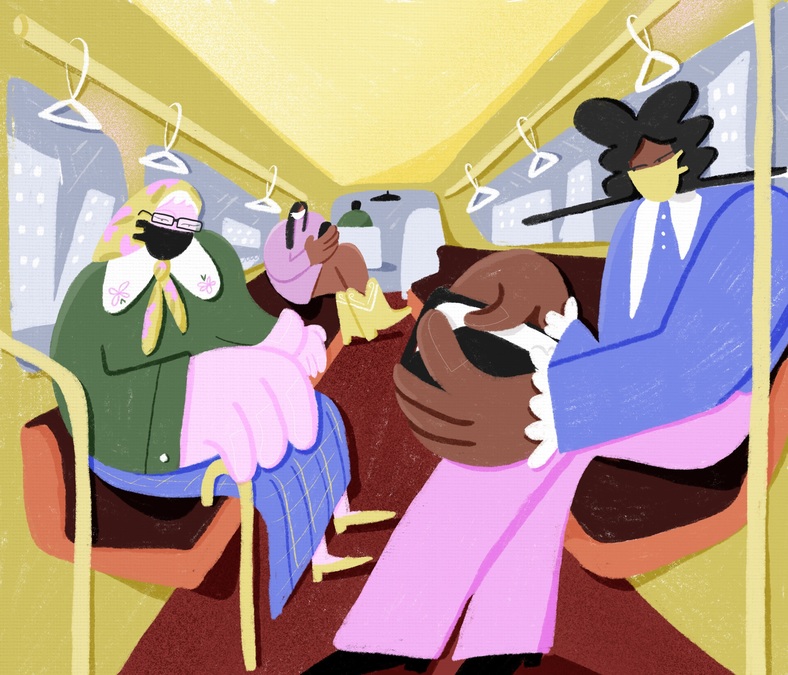Mask Up: Community care and wearing masks in 2025
Masks aren’t just for lockdowns. One writer explores how mask wearing – and other measures to reduce COVID transmissions – can help us look after one another in an increasingly authoritarian society
A few weeks ago, I got an email about a book event I had a ticket for, explaining that the author had requested all attendees wear a mask. The bookshop would also make masks available for those who didn’t have them. This email would have been standard a few years ago, but is pretty uncommon in 2025. Because – let’s face it – nowadays the majority of us act like the pandemic is over. Even though it’s not.
This misconception isn’t solely our individual fault. As Disabled philosopher of disability Élaina Gauthier-Mamaril points out, the UK Government has essentially declared that the pandemic is over, even though COVID is still classed as an ongoing pandemic by the World Health Organisation. We also have more evidence of how debilitating Long COVID can be – as TIME reports, the RECOVER Initiative has found that repeat COVID infections can double your chances of developing Long COVID.
There are people still masking for the safety of themselves and their loved ones, but the burden of keeping disabled and immunocompromised people safe is placed almost entirely on them. There's no acknowledgement that the structural care abled people might expect exists to support them is all but non-existent. In absence of care from the UK government, the venues that do still ask people to mask create a space where disabled and immunocompromised people know they can attend with much lower risk. Lighthouse, Edinburgh’s radical bookshop, asks all event attendees to wear masks and encourages folk browsing the shop to also do so. Mairi, the owner of Lighthouse, explains that this is part of the bookshop’s wider ethos of “disrupting the neoliberal, individualised sense of personal responsibility that is so responsible for making disabled people have to navigate needlessly difficult barriers to being part of public life.”
Mairi and the team at Lighthouse are committed to finding room in the shop’s small budget for masks. Of course, masks are expensive, but there are also groups working to make them more accessible. Edinburgh Mask Bloc are a grassroots mutual aid group who have distributed more than 2,000 high filtration masks. They supply pick up points around the city and support both regular and one-off events. With a similar ethos, Air Library Scotland loans out air purifiers for free across Edinburgh, as research shows these can reduce the risk of airborne disease transmission, including COVID. Structures do exist to help us look after each other – even if they’re not government-built structures.
Wearing a mask can be inconvenient and uncomfortable – and it’s vital we don’t ignore the needs of people for whom masking is impossible due to disabilities or sensory issues. But there are other ways you can mitigate the risk of COVID transmission and play a part in making spaces and events safer and more accessible.

Illustration by Fiorella Quaranta
Take vaccine boosters. A piece in Scientific American by Sara Novak published in October 2025 opens with the line: “Getting a COVID booster could save your life, even if you’ve had multiple prior infections and vaccinations.” Novak explains that a new study, published in the New England Journal of Medicine, suggests getting the booster is just as important for young people and those without risk factors. Despite this, the criteria for who’s eligible for one in Scotland has tightened this year. People who are immunocompromised and those over 65 are eligible for a flu vaccine; meanwhile, only those over 75 and a reduced group of eligible folks can get the COVID vaccine. You can still pay for a booster vaccine at many high-street pharmacies, of course… if you can afford one.
Testing before events – even if you're not feeling ill – also helps, because COVID can be asymptomatic. As does staying home if you are ill. As Gauthier-Mamaril tells me, we need to “create a society where no one will be unduly penalised for not going to work sick.” Such care can be taken into all areas of everyday life.
These acts of COVID risk mitigation are also intertwined with other issues: workers' rights and labour movements; our rights to privacy and protest. In Gauthier-Mamaril’s article for The Polyphony – co-authored with her friend and colleague Daniel P Jones – they write that: “the UK law (enacted under the 2022-2024 Sunak Conservative government) [states] that ‘Police will be given power to arrest protestors who wear face coverings.’” Wearing a mask at protests makes them more accessible and safer for disabled people, but Gauthier-Mamaril thinks that more people are actually wearing masks now to “ protect themselves from state surveillance and video footage” – especially given the government's brutal response to pro-Palestine protestors.
I am trying to get better at wearing a mask again. The book event email prompted me to stock up on my favorite black FFP2 masks, but I’m definitely not perfect. Starting masking again in 2025 means I – we – have to confront the fact that maybe we should never have stopped. It’s scary to admit that we might have been harming ourselves and our communities; that our government might not have our best interests at heart.
In 2025, wearing a mask is a sign of resistance in an increasingly authoritarian society. It’s a show of solidarity with disabled people. But even if you can’t mask, there are ways to show up and care for the people in your community. Our liberation is interconnected, and so must our efforts to keep each other safe.
